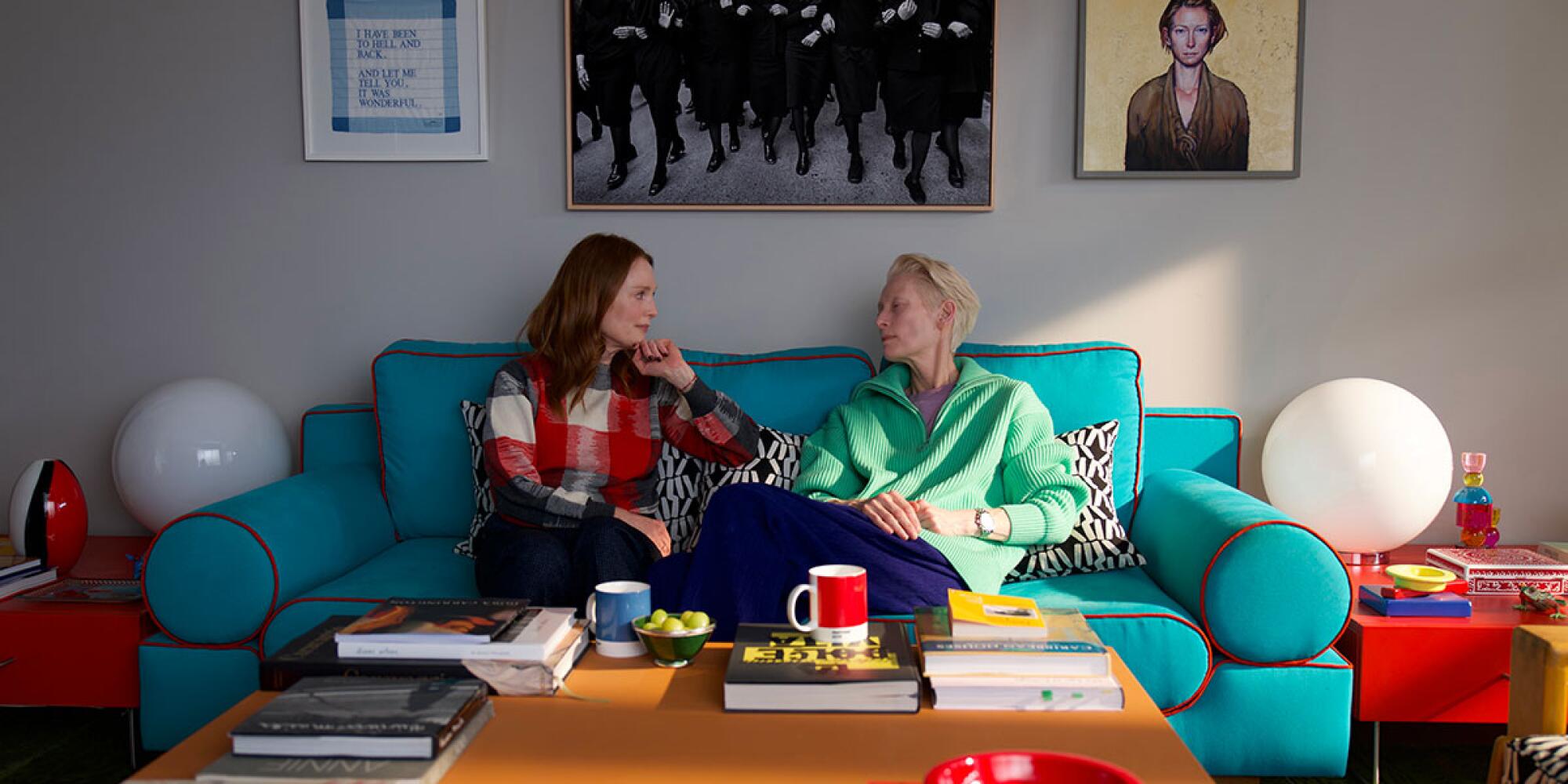Four directors take wildly different looks at mortality

Auteurs may be known for the distinctive personal themes their films often address. But several new works by noteworthy directors take on the subject everyone must deal with eventually: death.
Of course, Azazel Jacobs’ “His Three Daughters,” Paul Schrader’s “Oh, Canada,” David Cronenberg’s “The Shrouds” and Pedro Almodóvar’s “The Room Next Door” offer wildly different looks at mortality, with their creators’ signatures all over them.
“It’s the biggest story of all of our lives,” says Jacobs, whose Netflix feature brings adult siblings, played by Carrie Coon, Natasha Lyonne and Elizabeth Olsen, back to the claustrophobic New York apartment where they grew up to await their dying father’s final breath in a barely seen other room.
“Every time I look at the news, there’s somebody my age who I’ve heard about or know who’s just died,” Cronenberg, 81, observes. “So it’s difficult to evade thinking about mortality.”
That said, “Shrouds” — currently making the rounds at international film festivals ahead of a spring U.S. release — was more inspired by the 2017 death of the director’s wife of 38 years, Carolyn. With his signature blend of skewed technology and fleshly decay, Cronenberg tells the story of a grieving widower (Vincent Cassel) so attached to his late spouse (Diane Kruger) that he finances a whole cemetery where high-tech burial shrouds enable survivors to watch their loved ones decompose on tombstone-mounted video screens.
Schrader adapted his recently deceased friend Russell Banks’ novel “Foregone,” about a 1960s draft evader (played by Jacob Elordi) who, decades later and portrayed in failing health by Richard Gere, struggles to separate the truth from lies about his life as a documentary crew probes his illustrious filmmaking career.

Julianne Moore and Tilda Swinton star in Pedro Almodóvar’s “The Room Next Door.”
(TIFF)
“The impulse was to use the occasion of [Banks’] illness and him having written about dying to shoehorn my way into doing something about it myself,” Schrader, 78, says of the project that became “Oh, Canada.” “It was time for me to make a film about dying, and if I’m going to I’d better hurry up. You can write a dying poem on your deathbed, but you’re not going to direct a dying movie from your deathbed.”
Almodóvar adapted his first English-language feature from Sigrid Nunez’s novel “What Are You Going Through.” Like some of his earlier Spanish films (“Talk to Her,” “Pain and Glory”), the work explores unexpected connections that arise from morbid situations. In this case, Tilda Swinton’s terminally ill character implores a long-estranged friend, played by Julianne Moore, to be there while she prepares to end life on her own terms.
“It was important telling the story of someone that is dying in a world that is also dying,” Almodóvar says of the fatalism present in the film. “Living in this painful moment, you should find the moments to celebrate life.”
Themes from earlier works along with intimate, mortality-related experiences inform North American writer-director Jacobs’ latest films.
“This began for me by getting the news that one of my parents has a degenerative disease that will end their life,” indie mainstay Jacobs, 52, says regarding “Three Daughters.” He continues to care for his 83-year-old mother, Flo, and father, 91-year-old experimental film icon Ken Jacobs, in the Manhattan loft where they played versions of themselves in Azazel’s 2008 feature “Momma’s Man.”
“I had a window of time to work on this, understanding that very soon after shooting I would become much more involved in being a caretaker,” Jacobs adds. “So [mortality] permeated everything.”
Although he still claims not to know what the term “body horror” means, Cronenberg acknowledges that he’s considered its progenitor and master due to such movies as “Rabid,” “Scanners,” “The Fly” and “Dead Ringers.” He points out that he’s dealt with death ever since he killed his first onscreen character. But “The Shrouds,” of course, meant more to him than the others.
“Once you start to write a story, it becomes fiction, and maybe that’s what I needed it to be,” Cronenberg figures. “I needed to make invented characters. Any artist needs to have distance between what you’re creating and your emotions. They’re there, they’re driving it underneath, but you’re keeping them at a distance.”

Jacob Elordi stars in “Oh, Canada.”
(Festival de Cannes)
His caustic humor intact, Schrader has persevered through some tough trials in recent years. He was hospitalized with COVID-19 three times and lives in New York two floors above the apartment where his wife, actor Mary Beth Hurt, who has Alzheimer’s, receives 24/7 care.
“We call it luxury senior living, the new baby boomer phenomenon, which says nursing homes can be like the Ritz-Carlton,” cracks the “Taxi Driver” screenwriter, whose many directing efforts include a movie adaptation of another Banks novel, “Affliction.”
“For the last decade, I’ve taken the attitude: If this was my last film, would it be a good last film?” Schrader continues. “The idea of [“Oh, Canada’s”] refugee, who’s lived his life as a lie, coming clean but not really knowing what the truth is anymore, became the metaphor I was looking for.”
For Jacobs, making “Three Daughters” was a way to cope with his own looming loss.
“This thing that I love to do, making movies, is something that I can control about something that has been completely uncontrollable, even though it’s very foreseeable,” he says.
Cronenberg concurs but accepts that he got no consolation from doing it.

Elizabeth Olsen, from left, Carrie Coon and Natasha Lyonne in “His Three Daughters.”
(Sam Levy/Netflix/)
“I have not felt that it has done anything for me,” he says, releasing a shy laugh. “I dunno, I’ve always felt that art is not therapy. There’s been no such sense of what people talk about, like closure or catharsis. The pain and everything has not lessened; I do have more control over it, let’s say, but if I allowed it to, it could take over immediately.
“So it’s the strange act of committing art,” Cronenberg concludes. “It doesn’t do, perhaps, the obvious things, but you feel that it is the illusion of control, of some kind of control.”
Envelope writer Tim Grierson contributed to this story.





